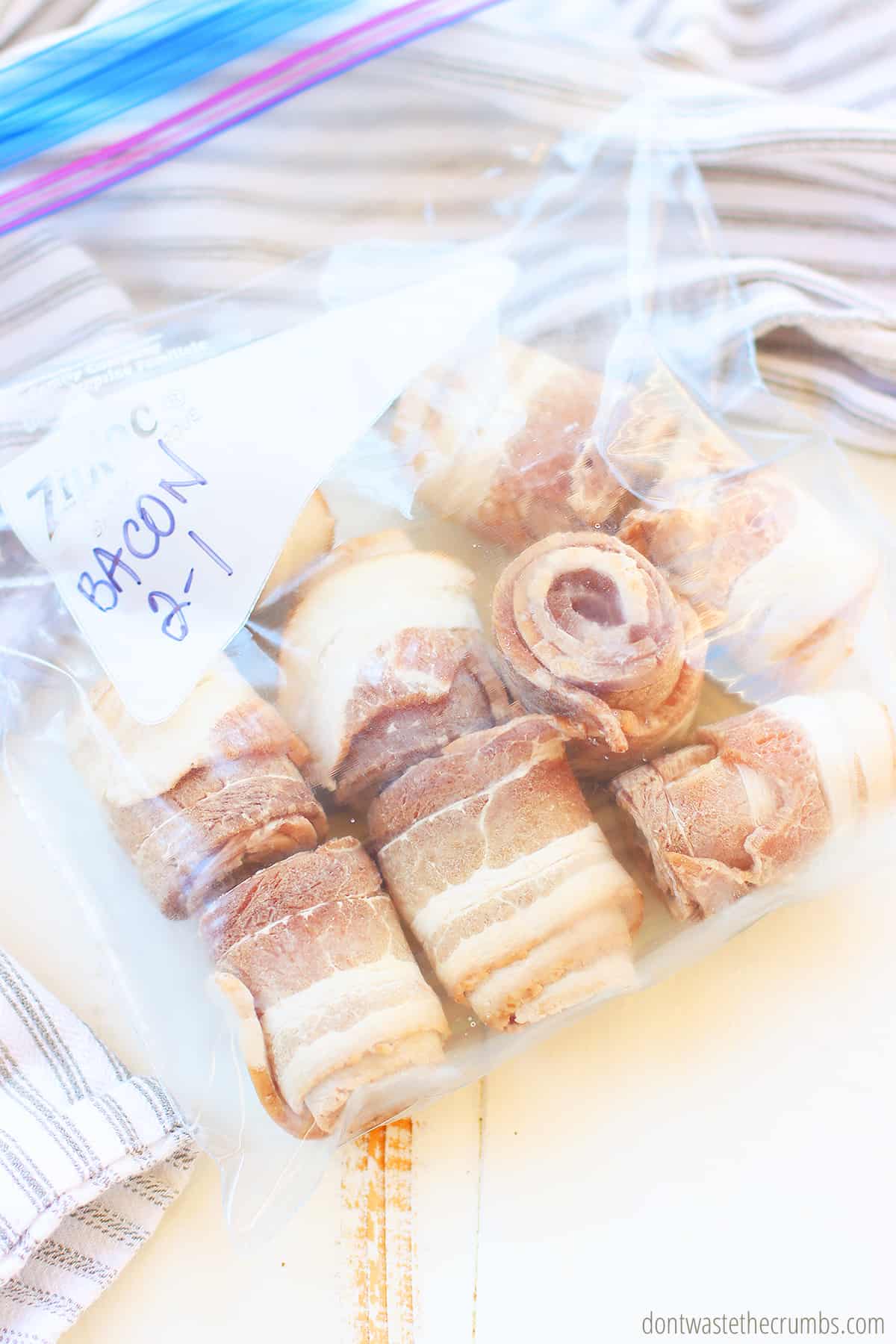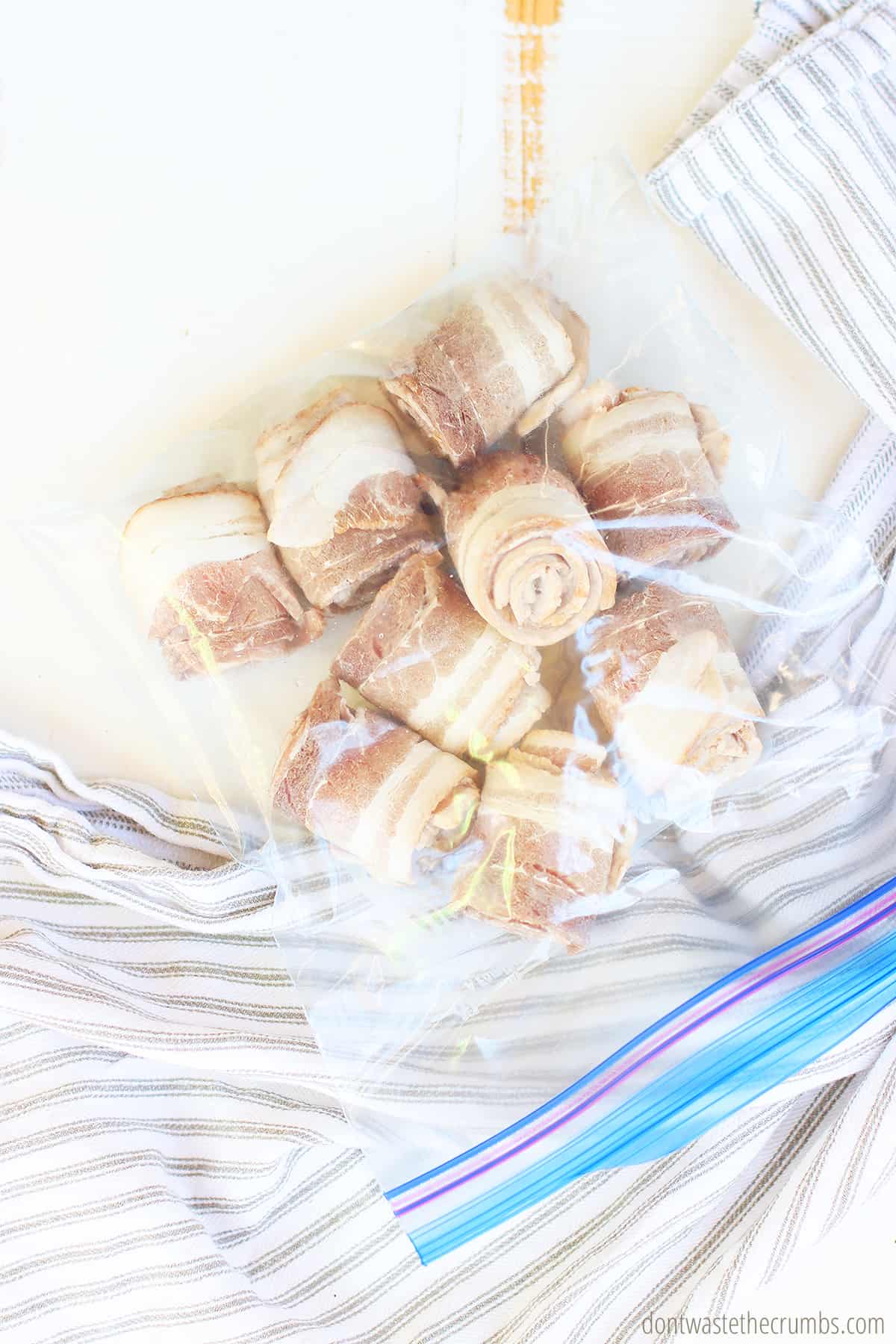Learn how to freeze bacon to save time and money! It’s very simple and quick, and it’s great for when you only need a few pieces of bacon for a recipe. Buy your bacon on sale and freeze with this method to stretch your meat and your budget!.
For recipes that call for bacon but not a whole pound, this method works great. For example, bacon brussels sprouts, bacon chicken Caesar salad wraps, or savory pasta with bacon all call for bacon.
If foods have been kept at 40F or lower, the USDA says they are safe to freeze again. Most refrigerators are kept at least this cool. You can go back and forth between the freezer and the fridge as many times as you want.
It can be hard to do that, though, especially if you forget to thaw meat ahead of time (like I do!).
I often let meat thaw in my sink, which means that if I want to freeze it again, I should cook it all first.
But I have a hard time cooking bacon for a recipe that doesn’t need quite as much…
Since everyone in my family LOVES bacon, there’s NO WAY that any of it will end up as leftovers!
Instead of cooking more than I need to, I should find a way to quickly thaw my meat because I forget to do it a lot of the time.
In the past few years, uncured bacon has become more popular as more people look for meats that don’t contain nitrates or nitrites. Instead of using artificial preservatives, this kind of bacon gets its cure from natural sources like celery powder. Many bacon lovers like the more natural, old-fashioned taste of uncured bacon because it doesn’t have any added ingredients.
However the lack of preservatives also means that uncured bacon has a shorter shelf life. So can you extend its freshness by freezing uncured bacon?
The answer is yes, you can freeze uncured bacon! Freezing is an excellent way to preserve uncured bacon and keep it tasting great When frozen properly, uncured bacon can last for 4-6 months in the freezer
Here is everything you need to know to freeze uncured bacon so you can get the most out of this tasty meat.
What Is Uncured Bacon?
Before we dive into freezing, let’s make sure we know what exactly uncured bacon is.
Instead of using nitrates and nitrites to keep the pork belly fresh, it is cured and smoked. This makes uncured bacon. Instead of chemicals, uncured bacon relies on natural curing agents like:
- Celery powder
- Celery juice
- Sea salt
- Brown sugar
- Spices like black pepper
These ingredients cure the pork belly while lending signature smoked bacon flavors. Reputable uncured bacon brands will be certified by associations like Paleo, Whole30, or Keto to guarantee no artificial preservatives were used.
When shopping for uncured bacon, look for buzzwords like “no nitrates or nitrites added” and confirm there are no suspicious ingredients. The bacon should consist of just pork, salt, spices, and plant-based curing agents.
Why Freeze Uncured Bacon?
Freezing uncured bacon allows you to:
-
Extend its shelf life – Uncured bacon lasts about 1 week beyond the sell-by date when refrigerated. But freezing extends its shelf life to 4-6 months.
-
Buy in bulk – Freezing means you can stock up on uncured bacon when it’s on sale without worrying about waste.
-
Reduce trips to the store – Frozen uncured bacon means fewer trips to restock the fridge.
-
Prevent waste – Freezing unused portions prevents leftovers from spoiling.
Freezing is the best way to make uncured bacon last longer. The froze environment significantly slows bacteria growth and chemical reactions that cause spoilage.
How to Freeze Uncured Bacon
Freezing uncured bacon is simple but proper technique is important to prevent freezer burn. Follow these steps:
1. Wrap in Plastic Wrap
Wrap strips or slabs of uncured bacon tightly in plastic wrap. Make sure there are no air pockets. This prevents freezer burn and moisture loss.
2. Seal in Freezer Bags
Place the plastic wrap-covered bacon into freezer bags. Squeeze out excess air and seal the bags. This gives extra protection.
3. Label Bags
Label bags with the contents and freeze-by date. The freeze-by date should be 4-6 months from the packaging date.
4. Freeze Immediately
Place bags in the freezer right away. Don’t leave uncured bacon hanging out in the fridge. Quick freezing maintains freshness.
5. Freeze at 0°F or Colder
Set your freezer to 0°F or -18°C or colder. Colder temperatures extend uncured bacon’s shelf life.
With these steps, your uncured bacon will freeze well for 4-6 months.
Thawing Frozen Uncured Bacon
Never cook frozen uncured bacon straight from the freezer. It must be safely thawed first.
Here are safe ways to thaw frozen uncured bacon:
-
Refrigerator – Thaw overnight in the fridge. This is the safest thawing method.
-
Cold Water – Seal bacon in a bag then submerge in cold water. Change water every 30 mins until thawed. Takes about 2 hours for 1lb.
-
Microwave – Microwave on the defrost setting in 1 minute increments. This can par-cook the bacon so be careful.
Avoid thawing bacon on the counter. This puts the bacon in the danger zone temperature range where bacteria multiply quickly.
Once thawed, use uncured bacon within a week for best quality. Don’t refreeze thawed bacon.
Cooking Frozen Uncured Bacon
You can skip thawing and cook frozen uncured bacon directly in some cases:
-
Oven-baked – Place still-frozen strips or slabs on a foil-lined baking sheet. Bake at 400°F, flipping halfway through.
-
Frying – Add frozen strips to a cold pan. Increase heat to medium-low and fry slowly, about 8 mins per side. Drain on paper towels.
-
Microwave – Microwave individual frozen strips for about 1 minute. Check often to avoid overcooking.
Keep in mind that cooking from frozen takes longer and can lead to uneven cooking. For best results, thaw first.
Storing Leftover Cooked Uncured Bacon
Have leftover cooked uncured bacon? Here are some storage tips:
-
Let cool completely, then refrigerate in sealed container. Use within 4 days.
-
For longer storage, freeze cooled cooked bacon up to 2 months.
-
Freeze cooked bacon slices on a parchment-lined baking sheet before transferring to bags. This prevents sticking.
-
Reheat leftovers in the oven or microwave until sizzling. Don’t reheat more than once.
With proper storage, you can enjoy cooked uncured bacon for up to 4 days. Freezing extends storage to 2 months.
Tips for Freezing Uncured Bacon
Follow these extra tips for freezing uncured bacon successfully:
-
Freeze in small portions – Freeze bacon strips, slices, or chunks in amounts you’ll realistically use. Avoid huge frozen blocks.
-
Note package dates – Write down any sell-by or use-by dates on the packaging so you know when to use the frozen bacon.
-
Maximize freezer life – Use frozen uncured bacon within 4 months for best quality. Discard if freezer life exceeds 6 months.
-
Handle with care – Frozen uncured bacon is brittle. Don’t drop or bang frozen bags around.
-
Prevent freezer burn – Use airtight packaging and minimize air exposure to prevent freezer burn.
Following these best practices will keep your frozen uncured bacon tasting delicious and fresh.
Frequently Asked Questions
Let’s wrap up with answers to some common questions about freezing uncured bacon:
How long does uncured bacon last in the fridge?
Unopened, it lasts about 1 week past the sell-by date. Opened, it lasts about 4-5 days. Always rely on smell and appearance rather than dates.
Can you refreeze thawed uncured bacon?
It’s not recommended. Refreezing leads to more moisture loss and texture changes. Cook thawed bacon within a week.
What happens if uncured bacon gets freezer burnt?
It’s still safe to eat but may have dry spots and an off flavor. Trim off any visibly burnt parts before cooking.
Can you freeze cooked uncured bacon?
Yes, cooked uncured bacon can be frozen for up to 2 months. Let it cool fully before freezing.
Should you rinse uncured bacon before freezing?
Washing uncured bacon before freezing is not necessary. Freezing as-is is fine.
Enjoy Your Frozen Uncured Bacon!
With this complete guide, you can confidently freeze uncured bacon to extend its enjoyment for months. Freezing uncured bacon allows you to always have this tasty meat ready for breakfasts, soups, salads, and any recipe that calls for bacon.
Be sure to use proper freezer bags, an airtight seal, and cold freezer temperatures. Thaw safely in the fridge, cold water or microwave before cooking for delicious results.
So try stocking up on uncured bacon on sale and freezing extras. You’ll save money while enjoying nitrate- and nitrite-free bacon conveniently whenever a bacon craving strikes!

What You’ll Need to Freeze Bacon
Exclusive for Crumbs Readers Sign up today to get their current offer.
Click this LINK to claim the offer.
Every month, Butcher Box brings grass-fed beef, pasture-raised and organic chicken, and heritage pork right to your door. Here is my honest review of Butcher Box, as well as a post about how to get the most out of it.

How to Freeze Bacon Step By Step
It’s also helpful if you buy bacon in packages greater than one pound. Even when I double my husband’s favorite Brussels sprouts recipe, I’ve never cooked more than one pound of bacon at a time. This will help you make sure you only use as much bacon as you need.
Step 1. Line a baking sheet with parchment paper and set aside.
Step 2: Open a package of thawed, raw bacon.

Step 3: Take off a piece of the back and roll it up like a sleeping bag, starting at one end. Place the bacon slice on the parchment paper so that it stands up and you can see the circle of bacon around the edge (like a cinnamon roll).
Step 4: Repeat with the remaining slices of bacon. Leave just a finger-width space between each slice on the baking sheet.
Step 5: Freeze for 4 hours, or overnight, until the bacon has frozen through.

Step 6: Remove the bacon from the baking sheet and place in a freezer-safe plastic container. Label the container with “frozen bacon” and the date.

- Take out as many pieces of frozen bacon as you need for a recipe and let them thaw. Put one roll of bacon in a small glass jar with a lid. Then, either put it in the fridge overnight to thaw or leave it out on the counter for a couple of hours to thaw quickly.
- Save the bacon grease; it’s a free, healthy fat that can be used in many simple recipes that need cooking oil, such as cornbread in a cast iron skillet, caramelized onions with Swiss chard, or zuppa toscana soup. Plus it adds a hint of delicious bacon flavor!.

